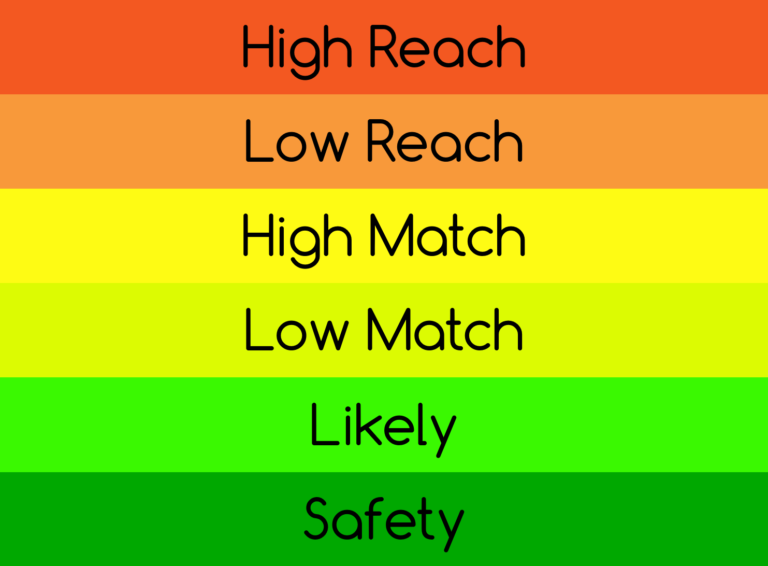
The fall semester of your senior year will remain very busy. It takes time to properly highlight in your applications all the work you have done over the past few years. Here is a step-by-step guide on what you need to do (note that some carry steps over from previous year recommendations).
- Recommendation Letters: You want to ask your teacher as early as possible. Read my recommendation letters post to help you determine which teachers to choose and how to make their job easier.
- Don’t Let Grades Slip: For early applications, your first quarter grades will be considered if available. For regular decision applications, your first semester grades will be considered. Remember that rigor and grades are the foundation for a strong application.
- Finalize Your College List: Your list should have been nearly final when you finished junior year, but if not, finalize it now. You should have at least one college in each category {High Reach, Low Reach, High Match, Low Match, Likely, Safety}. Meet with your school counselor for a sanity check on that list.
- Decide on Early Apps: A key part of your application process is deciding where to apply early, and where to apply regular decision. Seriously consider applying early decision, as it can significantly improve chances of admission.
- Sign Up For Info: If you haven’t already done so, sign up for emails from each college of interest. You should also open them when they arrive. Not only will they help you verify the college is a good fit, the colleges may also track your apparent “demonstrated interest”Methods colleges use to see if a student is really intereste... More in making their admission decision.
- Write those essays: Don’t procrastinate. As I explain in the essay primer post, you want to be done with all your essays for every college before you get back any early application decisions. Trust me. You won’t regret it.
- Financial Deadlines: If applicable, keep track of financial deadlines:
- If applying for scholarships, keep track of any essay requirements
- If applying for need-based financial aid, fill out the FAFSA by October 1, or as soon as possible afterwards. Many colleges also require the CSS Profile.
- College Application Deadlines: Mark on your calendar the deadlines for each of the following on your college list, as applicable. Get those applications out on time.
- Last date to request an interview
- Honors college applications
- Regular decision application (most often Jan 1)
- Early decision or early application (most often Nov 1)
- SAT or ACT: If you haven’t yet taken the SAT or ACT, or if you want to improve your score, then you should likely sign up and take these tests. Test scores are still important, even during this age when most colleges are test-optional.
- Rolling Admissions: If there are any colleges on your list with rolling admissions, apply early to those. Often these colleges will be in your “Likely” category, and you will feel better about getting a positive admission decision early in the game.
Early Application Results
If you applied early-decision, you will receive an admission decision by mid-December. If you got back good news from an early-decision college, congratulations! You are done. You must withdraw from any colleges where you applied early-action, and you cannot apply to any colleges for regular decision. You can now relax a bit, but don’t overdo the senior slide.
Many early-action colleges will also respond before December end as well. If you got back good news from one or more early-action colleges by then, go back through your college list and see which colleges you want to drop. For example, if you got into a High Match early, you might consider dropping some of your Likely colleges.
Don’t Overreact to Bad News
If your early college applications resulted in unexpected deferrals or rejections, you might think your application strategy was bad, and be tempted to change it for your regular decision applications.
Take a measured approach here instead of over-reacting. Have some trusted people review your essays and your application. These people may include your high school counselor, your parents, or an older sibling. Most importantly, you are verifying that your application didn’t somehow come across as either arrogant or sloppy. You also want to check that it properly showcases your qualifications.
In some cases, your counselor might be willing to give you feedback on if your recommendations are as strong as you hoped. The reality at this point is that you cannot change your recommendations, so they are what they are. But if they are not as positive as you hoped, you may want to put more emphasis on your match and likely colleges for regular decision.






